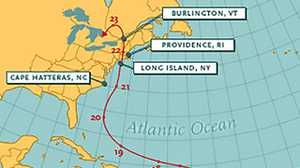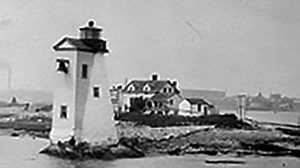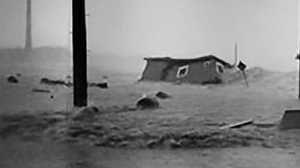Mrs. Orris B. Norman

Mrs. Orris B. Norman shared her experience of the Hurricane of 1938 with American Experience.
Being from Florida, where hurricanes are not too uncommon, I laughed when I sat down to observe what I thought was a peach of a windstorm. But I didn't laugh long.
I had just started my afternoon stint in the Old Mystic [Connecticut] Post Office, where I was also postmaster, janitor, and clerk, and when the window blinds began to bang, I tried to steady my jittery nerves by reading a magazine article.
I reckoned the stone building, more than a century old, with walls about two feet thick, was the safest place in an affair of this kind. But I soon changed my mind. Believe it or not, the building began to rock perceptibly, and the desk began to jump. That's about the time I got hysterical and decided it was time to close up. I fastened the window blinds and called my dog, Patsy.
Just as we stepped out the front door, the big elm tree in front of the house fell with a resounding crash across the telephone wires, snapping a brand new pole. That's when I realized we were really in for something.
Patsy ducked back into the Post Office unobserved. I made a mad dash for my house next door. On the way, I observed that most of the panes were gone from the attic windows, and I started up there to close the blinds. I found my brother, Ray Lord, frantically trying to nail the French door in my bedroom, which had blown off its hinges, to the door frame. And I stopped to hand nails, to count nails, and to assist him.
We then went to the attic, and he tried to nail a piece of linoleum over the attic windows, but it was useless. We had to abandon that when the blinds in the kitchen began to bang and window lights began to shower down like ripe apples, letting in the wind in full force. It gathered up the oilcloth on my kitchen table, wrapped it around the crockery in the middle of it, and dashed the whole business to the floor, breaking all the dishes, and leaving a nice slippery mess, which tripped us up as we tried to rush around.
The wind blew in a broken pane in my back door, and I grabbed a strip of linoleum and held it there while my neighbor, Mrs. Freeman, nailed it fast. It stopped the wind from that angle. Meanwhile, Sidney Freeman, her son, and my brother had tackled the kitchen window, but were unsuccessful in tacking linoleum to it until they brought wooden strips from the cellar to hold it.
Just about that time, the blind broke loose on the east living room window and half the window lights in that broke out, letting in a gale of wind that nearly blew us out of the house. I rushed to the attic and brought down a couple of storm windows, which miraculously fitted the opening, and with our combined forces, we managed to nail one fast.
About that time, I missed Patsy. I looked and called to her and started to search, but high water distracted my attention, and I got the gang together to save what we could out of the cellar while we could. We went down and put everything of value in a high place and I resumed my hunt for my dog.
In the meantime, I rescued my black cat from a precarious perch about six inches above the rapidly rising waters in the basement. I finally decided Patsy was locked in the Post Office and would drown. So I waded in water breast-deep to see if I could find her. I broke out a window pane and called to her but no answer, nor could I see her in the swirling waters inside. I could see miscellaneous effects of the office, however. (After the storm was over, my brother rescued her unharmed, but tired from swimming to save her life.)
My older brother, Ben, came home in a rowboat that evening. My husband, Constable Norman, when he arrived home Wednesday night, said he had been driving a bus along the streets of New London [Connecticut] and a large telephone pole had fallen across the roof of the bus, denting it. He and his passengers took refuge in an automobile agency office. He walked home from Mystic, where our car was flooded in front of the car barn, in company with four large yachts. After the excitement was over, I keeled over in a dead faint in Mrs. Freeman's kitchen. I guess the excitement was too much for me.
The next morning, everywhere I went, I saw faces full of misery and despair, as people who had barely been hanging on and trying to get along the best they could surveyed incalculable damage to their properties. I heard many stories of a miserable night spent in roofless and sometimes wall-less houses or how they had taken refuge with neighbors in the night. I saw parents who had spent the night worrying about children who had not returned from school. I saw people worrying about relatives and friends they could not communicate with and about whose safety they feared. I saw barns flattened to the ground. Hardly a barn was left standing in the whole village. Hen coops and other such light buildings were never found.
The streets were strewn with broken elms and other trees, many of which I had to crawl over or under in order to get through. I went up and surveyed the ruins of the Baptist church. It was unroofed during the storm and it will take thousands of dollars in my estimation to repair and make it the beautiful building that it was. The church, founded in 1706 by Timothy Wightman, was the oldest of its denomination in Connecticut.
Dozens of churches across New England lost their steeples in the storm.







